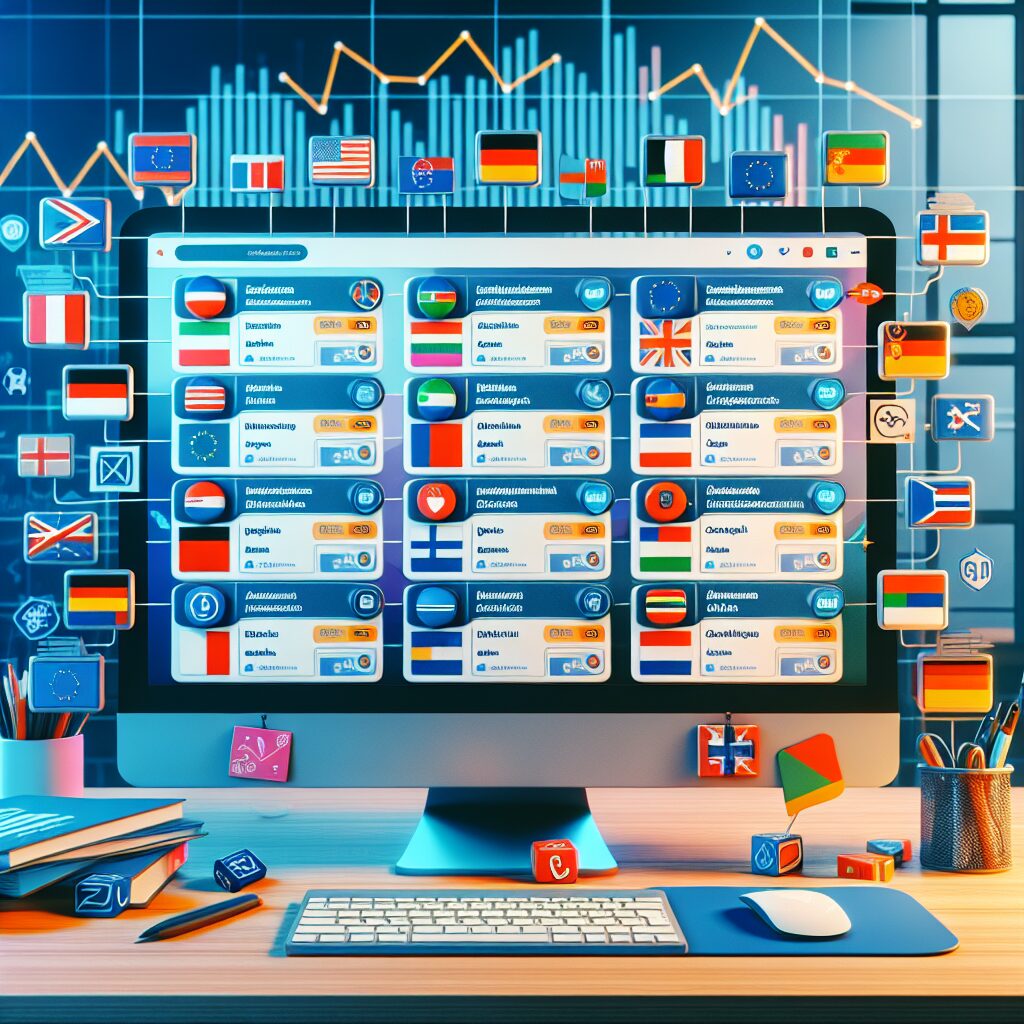About eldris
At Eldris, we automate SEO, multilingual site expansion, and EU compliance for brands scaling across Europe. Our AI-powered platform handles everything from content publishing to regulatory docs—so you don’t have to.
In This Article
- AI is reshaping SEO by automating content optimisation and forecasting ranking trends.
- Voice search demands content that mimics natural conversational language.
- Zero-click searches are rising; structure content for snippets and immediate visibility.
- Eldris and similar toolsets enable strategic agility with brilliant automation features.
- Core Web Vitals are crucial performance indicators that directly influence rankings.
- Global SEO requires true linguistic and cultural localisation—AI can ease the complexity.
- Google algorithm updates are best countered with real-time diagnostic tools.
- Video, interactive content, and cross-platform media integration boost SEO outcomes sustainably.
1. Introduction to SEO Trends for 2025
A Look Ahead at Search
SEO trends are evolving at a pace that demands proactive adaptation. As we approach 2025, businesses must acknowledge the growing complexity of digital discovery. From algorithmic refinements by search engines to behavioural changes in user interaction, the art and science of search engine optimisation are intertwined more than ever. In this guide, we will explore the primary SEO trends redefining the search landscape, including how artificial intelligence (AI), user experience, and algorithmic transparency are driving change.

2. The Role of Artificial Intelligence in SEO Evolution
Smart Algorithms and Automation
The rise of artificial intelligence has profoundly impacted how search engines analyse and rank content. Google’s RankBrain was only the beginning. Now, machine learning algorithms interpret intent with near-human intuition, prioritising contextual relevance over mere keyword frequency. AI-powered SEO tools like Eldris offer real-time optimisation suggestions, enabling marketers to tailor strategies with surgical precision.
Rather than optimising post-publication, AI-tooling allows preemptive analysis of content for tone, structure, readability, and keyword intent. Automated optimisation cycles ensure content is always aligned with dynamic search engine signals. This minimises manual effort while amplifying accuracy, translating into better SERP visibility and sustained performance.
“AI in SEO isn’t just about automation — it’s about enhancing strategic clarity and competitive agility.”
3. Voice Search and Conversational Queries
How Semantic Understanding Is Shaping SEO
Voice search is no longer an emerging trend—it is now a fundamental part of the SEO landscape. With smart speakers and voice assistants embedded in homes and smartphones around the world, traditional keyword optimisation is giving way to semantic search strategies. The key lies in anticipating natural language patterns and question-based phrasing.
Optimising for voice queries means adapting content to reflect how users naturally speak rather than how they type. Phrases like “What’s the best way to optimise my website for traffic?” outperform rigid phrases such as “website traffic optimisation”. By leveraging structured data and FAQs, marketers can align content more effectively with voice-powered search intent.
4. The Decline of Blue Links: Rise of Zero-Click Searches
Structuring SEO for Featured Snippets
Zero-click searches are becoming the new norm. Google is increasingly presenting users with answers directly in the SERPs via featured snippets, knowledge panels, and People Also Ask boxes. This trend is changing the traditional traffic model. Instead of chasing clicks alone, brands must optimise for visibility and brand recall within the SERP space itself.
To succeed, structured content must be crafted with brief, digestible answers near the top of the page. Clear formatting using bullet points, lists, and schema mark-up significantly enhances the likelihood of snippet extraction. Eldris and related tools can identify opportunities where your competitors are weak in snippet optimisation, creating strategic openings for rapid gains.
5. Eldris & Other AI Tools Reshaping SEO Workflows
Beyond Traditional Content Optimization
Eldris represents a new generation of SEO tools cutting across automation, AI-driven insights, and performance analytics. Unlike legacy platforms that require manual configuration and hours of data interpretation, Eldris leverages contextual AI to suggest instant optimisation fixes aligned with real-time algorithm behaviour.
What sets Eldris apart is its predictive modelling. Based on your content and historical SERP changes, it forecasts future keyword and topic trends. This transforms SEO planning from reactive to proactive. By integrating Eldris into your workflows, your team saves extensive research hours while improving on-page performance metrics.
Additionally, Eldris supports team collaboration, reporting automatisation, and localised content optimisation. When paired with platforms such as Learn more about SEO Trends and Automation, its full potential as a strategic driver of visibility and engagement becomes clear.
6. User Experience Signals & Core Web Vitals
Performance Metrics as Ranking Factors
User experience (UX) has become an irrefutable ranking factor, and Google’s Core Web Vitals are at its heart. Metrics like Largest Contentful Paint (LCP), First Input Delay (FID), and Cumulative Layout Shift (CLS) are now key influences in search visibility. Eldris simplifies technical audits by benchmarking these metrics and issuing priority-based remediation guidance.
To optimise UX, websites must deliver fast load times across devices, intuitive navigation, and minimal visual instability. Mobile-first design and accessibility adherence are no longer optional – they are mandated by search engine policies. Moreover, integrating user satisfaction signals—such as bounce rates and on-page time—into monthly SEO reports from platforms like Read a related article allows for deeper tactical execution.
UX-focused SEO requires a cross-functional digital strategy, efficiently achievable when automated tools scan, flag, and resolve technical gaps at scale.
7. Multilingual & Global SEO Strategies for 2025
Scaling with AI for Diverse Markets
Global reach demands linguistic sensitivity. With AI-powered translation and localisation features, tools like Eldris are enabling organisations to scale content across regions. But translation alone doesn’t equate to effective global SEO. Keywords differ culturally, search behaviour shifts per region, and user expectations vary drastically.
To capitalise on international markets, marketers must develop unique content strategies per geography. Multilingual schema mark-up, hreflang implementation, and local keyword research are mission-critical. AI accelerates this by automating market demand analysis, surfacing native idiomatic expressions likely to perform in each target locale.
Integrating AI localisation with region-specific backlink strategies ensures that your international content not only ranks but resonates. For example, targeting French-speaking Canadians requires a different semantic structure than targeting audiences in metropolitan France, no matter how similar the language appears.
8. The Impact of Google’s Algorithm Updates
Adapting Fast with Automation
Search algorithm updates are now so frequent that manual SEO audits cannot keep up. Eldris and similar tools offer continuous monitoring and diagnostic capabilities. This means that when an update causes ranking shifts, marketers are alerted in real-time with actionable insights about what changed and why.
From volatility charts to AI-powered suggestions for content rewrites, tools are now equipped to auto-compare your SERP presence before and after major updates. They also recommend cyclical review periods, ensuring your content complies with the latest E-E-A-T (Experience, Expertise, Authoritativeness, Trustworthiness) criteria.
Reacting swiftly to algorithm changes is not just a competitive advantage—it is an existential necessity for SEO success in 2025. Platforms that automate the response cycle will improve content resilience over time and secure greater ranking stability.
9. Video SEO & Interactive Content Integration
Enhancing Visibility via Engaged Media
Video content has rapidly become indispensable to effective SEO strategies. YouTube remains the second-largest search engine globally, and Google increasingly prioritises video-rich pages in its SERPs. Embedding optimised videos—with accurate titles, captions, and rich metadata—drives both dwell time and click-through rates.
Interactive content goes even further, transforming web experiences into dialogue-driven journeys. Quizzes, calculators, and other dynamic media elements increase user involvement, reduce bounce rates, and fulfil Google’s engagement-focused ranking criteria. Eldris offers video content scoring tools that examine tagging, schema markup, and behaviour metrics to gauge optimisation levels.
By synchronising traditional text with multimedia experiences, brands can ensure a well-rounded SEO strategy that performs both informationally and visually. Anchoring interactive content within optimised page structures ensures seamless crawling while giving users multiple layers of value-driven interaction.
10. Conclusion: Navigating the Future of Search
As search engines become more sophisticated and user expectations rise, mastering SEO in 2025 requires strategic foresight and advanced tooling. From voice and video to Core Web Vitals and multilingual content, modern SEO is comprehensive, fast-paced, and reliant on intelligent automation. Tools like Eldris spearhead this revolution by demystifying complexity and scaling expertise across organisations. Staying ahead means embracing AI, adapting to zero-click search realities, focusing on UX, and localising your content thoroughly. The SEO landscape will continue to transform—those embedded with AI-driven agility will thrive where others struggle.
Great guide on the-future-of-seo-predictions-and-trends-shaped-by-tools-like-eldris – Community Feedback
What will shape SEO in 2025?
AI-driven tools, conversational search, zero-click results, and enhanced user experience are set to shape SEO in 2025.
How do AI-powered platforms like Eldris impact SEO?
AI platforms streamline SEO workflows, automate content optimization, and help adapt to algorithm changes quickly.
Is video content important for future SEO?
Yes, engaging video content is increasingly vital as search engines prioritize diversified and interactive media.








